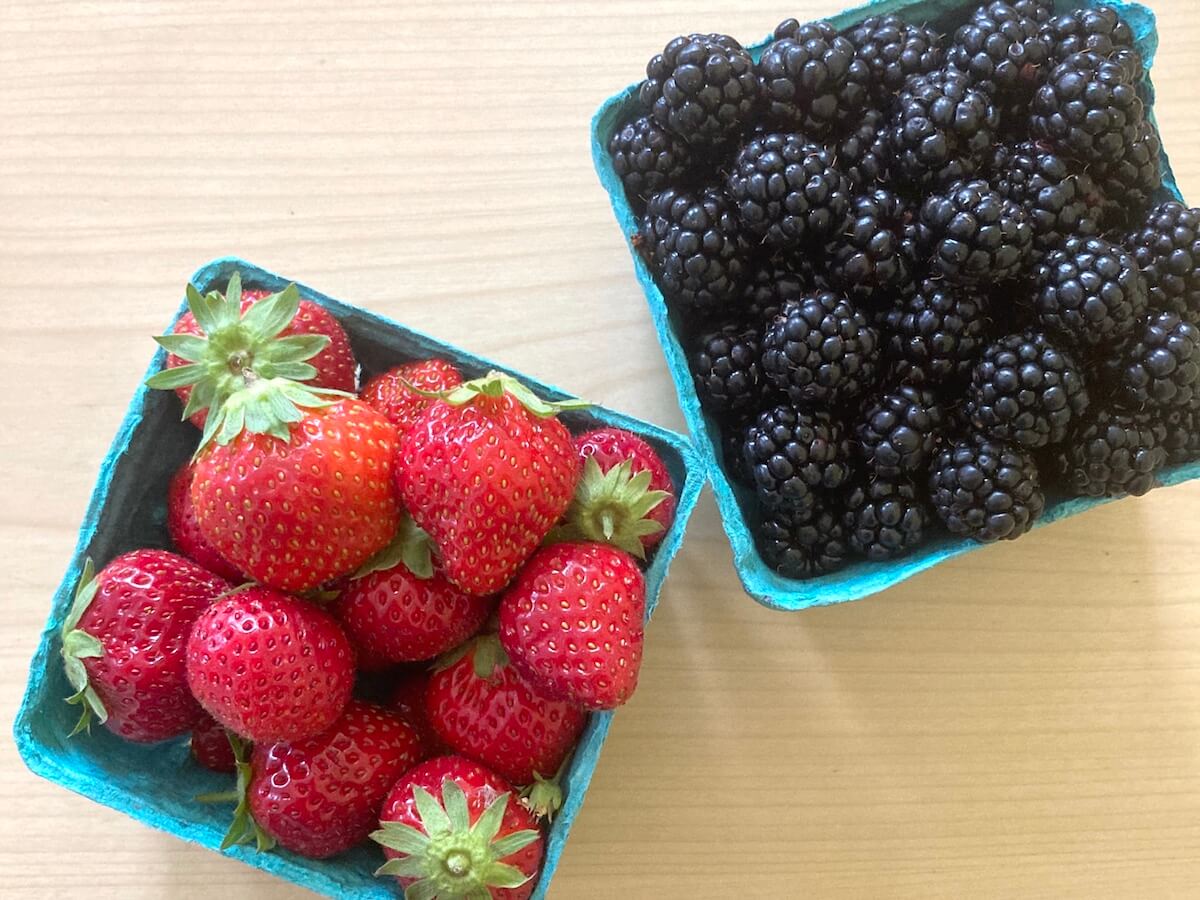Hello from week 19-going-on-20 of lockdown. Things continue more or less the same in my household with both of us working from home. We make weekly trips to the grocery store and farmers market. (That’s where the berries above are from.) My last lockdown life update was in week 7 in April. Somewhere between then and now, I started to feel a bit depressed, so I’ve reconnected with my therapist. (I imagine therapists must be busy with all the increased anxiety, grief, and other feelings people are dealing with these days.) We’ve met up with a friend in a park once and dropped off supplies to a relative twice — both while masked — but otherwise we haven’t socialized in person.
Over the past few months, California reopened some things cautiously. In San Francisco, we are in stage 2, which means low-risk businesses and activities can open (social distancing and masks required!). The grocery store in our neighborhood took down their stanchions directing customers along a one-way route through the store. Retailers opened for curbside pickup in May. In June, tables appeared on sidewalks as outdoor dining was permitted. I still don’t feel comfortable eating at a restaurant, even if outside. But we’ve been partaking in takeout more frequently.
I still don’t feel comfortable eating at a restaurant, even if outside. But we’ve been partaking in takeout more frequently.
However, cases are surging, so things are rolling back. Most indoor businesses in the Bay Area are closed now, though some indoor retail can remain open with approved plans. Much of California (38 out of 58 counties as of July 31) is on the state’s COVID-19 watchlist. Yikes.
Shopping wise, I remain mostly uninterested though there are days I feel the urge. Sometimes I sit there just typing in the names of brands I like on Poshmark to see what pops up. Other times I visit an item I’ve had my eye on, like this Two Days Off dress. (I can’t decide if it would be cute on me.) I recently learned about an ethically-made and stylish comfort shoe brand, dr. Liza, and am dreaming of shoes to wear post shelter-in-place. (It’s Black-owned as well. I just added it to my list of Black-owned ethical fashion brands.)
Since my last shopping update, I’ve bought 2 things, bringing my total for the first 6 months of the year to 8 items. (My goal for this year is to buy no more than 20 items, half of them secondhand.) But I confess to buying these things from Everlane. I say confess because I feel like a hypocrite for shopping with them. (Though in my defense, I was using up store credit. Hey, I’m not going to leave money on the table.)
If you haven’t been following the drama, this New York Times story, “Everlane’s Promise of ‘Radical Transparency’ Unravels,” lays it out. At the start of the pandemic, Everlane laid off staff, including many of their part-time customer service staff. A number of those let go had been forming a union. The layoffs came days after they asked for formal recognition. Was it retaliation? Everlane says no, but it sure looks that way. More recently, former employees called out the company for its racist work environment.
This disappoints me greatly. A fair number of Everlane items hang in my closet. I was won over by the brand’s emphasis on ethical production, its general good quality and customer service (provided by the very folks who were laid off), and a price point that worked for my wallet. I’ve been critical at times (last year I wrote about how the company seemed to release products at a faster pace) but on the whole, I was glad they were there. However, a sustainability expert in the New York Times story says, “They do some good work, but I wouldn’t describe it as radical. The most radical thing about Everlane is the marketing.”

The Everlane store in San Francisco.
As someone who has reviewed a lot of Everlane products, I felt that I would be giving their behavior a tacit OK by continuing to write about them. Though I didn’t announce anything, I stopped writing about them at the end of March. (The one exception is this recent review on sweaters and I explain why I wrote it in the piece.) I also stopped mentioning them on Instagram or paying attention to new releases.
As someone who has reviewed a lot of Everlane products, I felt that I would be giving their behavior a tacit OK by continuing to write about them.
Full disclosure: I do have affiliate links to Everlane on this blog. Should someone make a purchase after clicking on my link, I make a small commission. In that way, I have a financial incentive to write about their products. (But, I only write about things I’m interested in and was going to try anyways.) I’m leaving those links up because I’ve already put work into those reviews. I’ve spent hundreds of hours writing them, and any income I make from these posts is something, frankly, I’m not willing to forgo. This blog takes time and work, and it’s nice to make a little something for it.
Otherwise, I don’t really have a relationship with Everlane. I’m small potatoes in the ethical fashion blogging space. Once, and only once, Everlane gifted me a product. My review must not have driven many sales to them because they never sent me anything else to try.
Of course, the backdrop to all of this is that we’re in the middle of a devastating pandemic. Many retailers have laid off staff. Small business have closed for good. Big ones, including ones I frequent like Trader Joe’s, have also been accused of union-busting or treating low-wage essential workers badly during these times. (They’ve always been treated badly, but it’s even more apparent now.) Big brands like the Gap, Kohl’s, Levi’s, Target, and J.C. Penney, have canceled orders and not paid for already-made garments, prompting the #PayUp campaign to publicly pressure them. (With some success! Out of the few brands I mentioned here, Gap, Levi’s, and Target have agreed to pay.)
And then, there’s the news that virtually the entire fashion industry is complicit in forced labor. A human rights coalition says that 20% of cotton products worldwide are most likely made with the forced labor of Uighur people incarcerated in China’s Xinjiang region. The coalition’s list of brands that it says are complicit includes Adidas, Amazon, Gap, H&M, and Uniqlo. But it also includes brands I had considered to be more conscious than others, like Costco, Ikea, Muji, and Patagonia.
As in most everything, there are degrees. At the horrible end is forced labor of an ethnic minority. (Not to discount the experiences of Everlane employees. I am also a woman of color and have worked in an environment that was toxic to people of color, so I understand.)
It’s not that I want these brands I’ve been a customer of to go down. What I want is for them to do better. And I do hope that they survive the pandemic. But at the same time, now more than ever, it’s important to vote with our dollars. If I’m going to spend money, I might as well spend it at a business that hasn’t been an asshole to employees. For now, I’ve decided to not buy directly from Everlane (or Muji) anymore until they show improvement. What exactly does that look like? I’m not quite sure, but I’m paying attention to what happens next.
Welcome Objects 20 in 2020 Wardrobe Count To Date – Q1 + Q2
Additions: 8
Number of Additions That Are Secondhand: 1 (12.5%)
Subtractions: 5





I’m really glad that you addressed the elephant in the room. I too have stopped posting on Everlane and have been donating affiliate proceeds I receive to COVID relief for the time being. I’m choosing to highlight other brands that reach out to me and discovering ways to make a better effort to promote smaller women founded/POC businesses. Everlane now has the opportunity to take responsibility to correct these issues starting from within their organization. That would be “radical”!
Well said! Love that you are bringing attention to smaller businesses that are founded by women and POC.